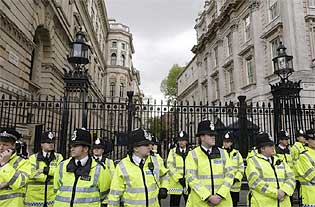 The Republican National Committee should pay for them, too. They can tell their members it's a 'Bobbie tax'.
The Republican National Committee should pay for them, too. They can tell their members it's a 'Bobbie tax'.The British government on Monday downgraded its terror threat level from critical to severe, saying intelligence suggested that an attack was not imminent. While the government said passengers would now be permitted to carry a single bag onto planes, authorities at London Heathrow and other major airports said the ban on carry-on luggage would continue for another day.
And, in a related story, "British Release One of the People Arrested in Bomb Plot," and "would not say if the person was still under suspicion."
Seattlepi.com reports:
As the immediate security threat at British airports wanes, airlines are beginning to count the multimillion-dollar cost of the terrorist alert - and consider who should pay.
British Airways PLC on Tuesday led a growing campaign against the British Airports Authority, which many carriers claim was ill-prepared for the emergency that led to hundreds of canceled or delayed flights.
A joint compensation claim against BAA, which operates seven airports around Britain including London's Heathrow, Stansted and Gatwick, could run as high as 300 million pounds ($570 million), based on analyst estimates of the airlines' daily losses.
Airlines say BAA was too slow to respond when the government imposed strict security checks on all passengers and a ban on onboard baggage last week after the discovery of a plot to blow up several airplanes on the trans-Atlantic route.
The alert crippled airport operations on Thursday and BAA has struggled to get flight schedules back to normal since then.
Analysts estimate that the crisis could be costing British airlines a combined 50 million pounds ($95 million) a day, putting the total costs at 300 million pounds ($570 million) by the end of Tuesday.
BAA, which was recently acquired by Spanish construction giant Ferrovial SA for 10 billion pounds ($19 billion), said it had no immediate comment on the compensation claims but two people close to the airports operator said it would likely fight any such action from airlines.
The airports operator kept bans on hand luggage in place for an extra day after the government eased the security threat level Monday. In a bid to ease congestion, it also ordered all airlines to cut the number of their departures by between 20 percent and 30 percent each day since the alert, with the threat of losing all their flight slots if they did not.
BAA lifted that requirement Tuesday but British Airways again canceled 20 percent of its flights and said there would be more cancellations Wednesday, blaming the scrapped flights on BAA's inability to cope.
The airline said it was actively considering whether to pursue BAA for compensation.
"Since 9/11, everyone in the industry has known there might be times when extra security measures needed to be put in place," British Airways Chief Executive Willie Walsh told the Daily Mirror newspaper. "Yet when the moment struck, BAA had no plan ready to keep the airport functioning."
Budget airline Ryanair Holdings PLC also canceled more flights Tuesday from Stansted, its key London airport.
"This morning, we had a situation where, despite assurances to the contrary, the staff were not in place," said Ryanair spokesman Peter Sherrard. "An hour before scheduled flights, there were still only half the 14 security points open."
Ryanair, which said it has seen a 10 percent dropoff in bookings since Thursday, said it was considering legal action against the government in order to reduce security screening delays at airports. It said it would consider compensation after it dealt with the current logistical issues.
It said the current restrictions, which still bar any liquids from being taken through security points, should be reviewed or alternatively police or army personnel should be deployed to speed up the screening of passengers.
Virgin Atlantic Airways said it was considering all options and was prepared to discuss compensation with BAA.
"Airlines have incurred substantial costs in the past few days, collectively running into millions of pounds and clearly we need to consider all the options for possible contributions to these costs, whether it be possible rebates, compensation or government support," it said in a statement.
However, no-frills carrier easyJet PLC said it had no plans to join in any attempt to sue BAA for compensation. Spokeswoman Samantha Day said BAA had dealt with the crisis as best as it could and the industry was better off discussing how to cope with future alerts.
BAA currently owns and operates airports that handle 63 percent of travelers to and from Britain - a figure that rises to 86 percent in Scotland and to 92 percent in London.
Britain's competition watchdog is considering a detailed inquiry into the domestic airport market and whether BAA's dominance delivers the best value for air travelers.
A full probe by the Competition Commission, which was mooted in the middle of the takeover battle for the airports operator in May, could complicate any bid from airlines for compensation.
Filed under: terrorist alert, Great Britain, Tony Blair, Bush, RNC, Republican National Committee, The Constant American, Constant American, Technorati Tag, Technorati Tags, tags, categories

No comments:
Post a Comment